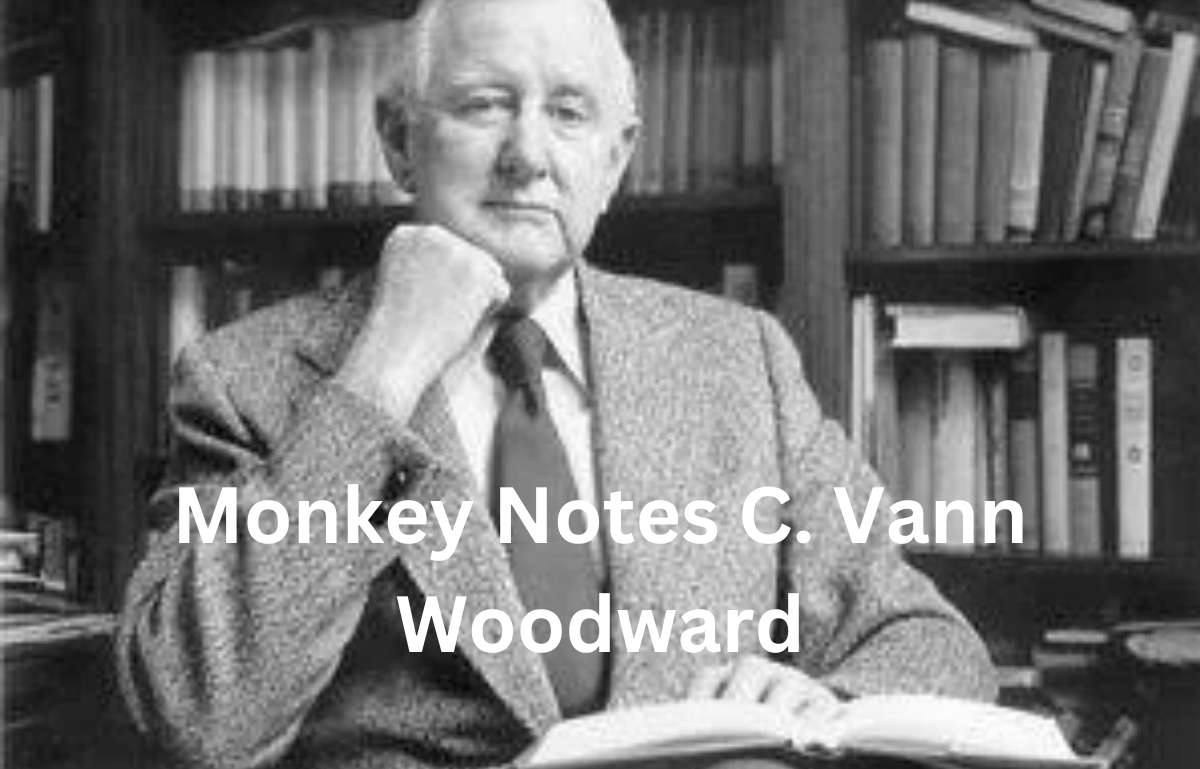Monkey Notes C.Vann Woodward stands as one of the most influential historians of the 20th century, known for his groundbreaking studies on Southern history and the Civil Rights Movement. His works have reshaped our understanding of segregation, Reconstruction, and the evolution of racial dynamics in the United States.
In the realm of academic study, Monkey Notes has emerged as a valuable resource for summarizing and simplifying complex works of literature and history. When it comes to Woodward’s legacy, Monkey Notes plays a key role in helping students, researchers, and history enthusiasts grasp his ideas.
This article explores C. Vann Woodward’s major works, the role of Monkey Notes in simplifying them, and why Woodward’s scholarship remains essential today. From accessible breakdowns of his critical works to insights into their modern relevance, this guide provides a comprehensive understanding of both the historian and the tools that make his work accessible.
Understanding C. Vann Woodward
Who Was C. Vann Woodward?
C. Vann Woodward was a renowned American historian born in 1908 in Arkansas. He grew up in the Jim Crow South, an environment that would profoundly influence his perspectives on history and race. Woodward attended Emory University and later earned his doctorate at the University of North Carolina. Over the course of his career, he taught at prestigious institutions like Johns Hopkins University and Yale University.
Monkey Notes C.Vann Woodward His upbringing and education shaped a deep curiosity about Southern culture, economics, and politics. Woodward’s experiences during significant historical periods, such as the Civil Rights Movement, inspired him to challenge traditional interpretations of the South’s history.
Through his work, Woodward sought to uncover the complexities of racial segregation, Reconstruction, and Southern identity. His scholarship is distinguished by its intellectual rigor and moral clarity, making him one of the most respected voices in American history.
C. Vann Woodward as a Historian
As a historian, C. Vann Woodward’s work stood apart for its willingness to challenge established narratives. Rather than accepting the status quo, he examined the economic, political, and cultural forces that shaped Southern history. Woodward’s writing style combined academic precision with a storytelling flair, allowing his works to resonate with both scholars and the general public.
He focused on three core themes in his work: race, class, and the economic struggles of the South. By emphasizing these themes, Woodward revealed how deeply interconnected they were in shaping the region’s history. His analysis of segregation and Reconstruction remains particularly influential, offering fresh perspectives on events often misinterpreted by earlier historians.
Woodward’s approach also emphasized the role of human agency in history. He believed that historical outcomes were shaped by choices and circumstances, rather than being inevitable. This perspective made his works essential for understanding both the failures and possibilities of Southern history.
Key Themes in Woodward’s Work
C. Vann Woodward’s scholarship is built upon several recurring themes:
- Southern History and Racism: Woodward focused extensively on the roots of racial segregation and its consequences. His work highlighted how segregation was not an inevitable outcome but a constructed system designed to maintain power structures.
- Civil Rights and Reconstruction: Woodward analyzed the post-Civil War era to examine how Reconstruction offered opportunities for equality, only to be undermined by systemic failures and political compromises.
- Class and Economics: His writings also explored the economic struggles of the South, especially during Reconstruction and the early 20th century. He demonstrated how economic inequality intersected with race to shape Southern society.
These themes remain central to understanding both Woodward’s works and the broader historical narrative of the American South.
Exploring C. Vann Woodward’s Major Works
The Strange Career of Jim Crow
Monkey Notes C.Vann Woodward The Strange Career of Jim Crow is perhaps Woodward’s most famous and impactful work. Published in 1955, it offered a revolutionary perspective on the history of segregation in the United States. Woodward argued that racial segregation was not a long-standing tradition in the South but rather a product of the late 19th and early 20th centuries.
The book dispelled the myth that segregation was inevitable or rooted in ancient practices. Instead, Woodward traced its origins to political and economic decisions made after Reconstruction. He argued that segregation was deliberately implemented as a tool to control both black and poor white populations, maintaining the dominance of Southern elites.
The Strange Career of Jim Crow had a profound influence on the Civil Rights Movement. Dr. Martin Luther King Jr. called it the “historical Bible of the Civil Rights Movement,” as it provided evidence that segregation could be dismantled. Monkey Notes for this book simplify its key arguments, themes, and historical context, making it accessible for students and researchers alike.
Origins of the New South, 1877-1913
In Origins of the New South, published in 1951, Woodward delved into the economic and political changes that shaped the Southern United States after Reconstruction. He examined how the region transitioned from a society based on slavery and agriculture to one dominated by industrialization and economic inequality.
Woodward argued that the “New South” was not as progressive as it claimed to be. Instead of creating opportunities for equality, the post-Reconstruction era deepened class divides and racial inequalities. He also analyzed how political compromises and economic exploitation shaped this transformation.
This book remains a cornerstone of Southern historiography. Monkey Notes for Origins of the New South provide clear chapter breakdowns, highlighting Woodward’s arguments and their relevance to understanding modern Southern history.
Reunion and Reaction
Monkey Notes C.Vann Woodward Reunion and Reaction focuses on the political compromises that shaped the post-Reconstruction era in the United States. Woodward examined how Northern and Southern politicians reached agreements to reunify the nation, often at the expense of African Americans.
He argued that these compromises allowed Southern elites to regain power while undermining the progress made during Reconstruction. This work underscores the role of political decisions in shaping racial and economic inequalities.
The Monkey Notes for Reunion and Reaction provide a detailed analysis of Woodward’s key arguments, offering readers an accessible way to understand the political dynamics of this critical period in American history.
Essays and Collected Works
In addition to his major books, Woodward wrote numerous essays that explored key aspects of Southern history and American politics. These essays reflect his sharp analytical skills and commitment to challenging historical assumptions.
Monkey Notes provide summaries and insights into selected essays, highlighting their key themes and historical significance. Whether focusing on race, class, or economic policy, Woodward’s essays remain vital for understanding the complexities of American history.
What Are Monkey Notes?
Definition and Purpose of Monkey Notes
Monkey Notes C.Vann Woodward Monkey Notes are concise, easy-to-understand study guides designed to help readers analyze and comprehend complex works of literature and history. These notes provide chapter summaries, theme analyses, character breakdowns, and key quotes. They are particularly popular among students and researchers who need quick insights into challenging texts.
For C. Vann Woodward’s works, Monkey Notes simplify his dense historical narratives, making them accessible without sacrificing depth. These guides serve as valuable tools for understanding Woodward’s arguments, historical contexts, and enduring significance.
The Role of Monkey Notes in Understanding Woodward’s Work
Monkey Notes play a crucial role in helping readers engage with C. Vann Woodward’s complex works. Woodward’s books are rich in historical detail and analysis, which can be overwhelming for readers unfamiliar with the subject matter.
By breaking down chapters, themes, and arguments, Monkey Notes make Woodward’s scholarship more accessible. They help students and researchers identify key takeaways, analyze critical quotes, and understand the broader significance of his work. In this way, Monkey Notes bridge the gap between academic rigor and reader comprehension.
How to Use Monkey Notes Effectively
Tips for Students
For students studying C. Vann Woodward’s works, Monkey Notes offer an invaluable resource. Here are a few tips for using them effectively:
- Start with Chapter Summaries: Use the notes to understand the structure and main arguments of each chapter before diving into the full text.
- Focus on Themes: Identify key themes such as race, class, and Reconstruction to understand the broader message of Woodward’s work.
- Highlight Key Quotes: Monkey Notes often include significant quotes. Use these to support your essays and analyses.
Tips for Scholars and Researchers
Monkey Notes C.Vann Woodward For scholars and researchers, Monkey Notes provide a quick reference for complex historical works. By summarizing Woodward’s arguments and evidence, these guides help streamline research and analysis. Scholars can use Monkey Notes to:
- Quickly locate key arguments and chapters
- Compare Woodward’s work with other historical perspectives
- Identify themes and patterns for further research
Why C. Vann Woodward Matters Today
Modern Relevance of Woodward’s Historical Analysis
C. Vann Woodward’s scholarship remains profoundly relevant in today’s social and political climate. His works provide critical insights into the origins of racial segregation, the failures of Reconstruction, and the economic struggles of marginalized communities.
By understanding these historical dynamics, we can better address contemporary issues such as systemic racism, economic inequality, and political polarization. Woodward’s work reminds us that history is not inevitable—it is shaped by human choices and actions.
Woodward’s Role in Shaping Southern Narratives
Woodward’s writings challenged traditional narratives about the South, offering a more nuanced and critical perspective. His work continues to influence historians, educators, and activists seeking to understand and challenge systems of inequality.
Conclusion
C. Vann Woodward’s legacy as a historian lies in his ability to challenge assumptions, uncover hidden truths, and inspire critical thinking. His works remain essential for understanding the complexities of Southern history, racial dynamics, and political struggles in the United States. Monkey Notes serve as an invaluable tool for making his scholarship accessible to students, researchers, and history enthusiasts alike.
Monkey Notes C.Vann Woodward By bridging the gap between academic rigor and reader comprehension, Monkey Notes ensure that Woodward’s contributions to American history continue to inspire new generations.
FAQs
Q1: Who was C. Vann Woodward, and why is he important?
A: C. Vann Woodward was a prominent American historian known for his groundbreaking studies on Southern history, racial segregation, and Reconstruction.
Q2: What is the main message of The Strange Career of Jim Crow?
A: The book argues that segregation was not a long-standing tradition but a product of political and economic decisions after Reconstruction.
Q3: How do Monkey Notes simplify C. Vann Woodward’s works?
A: Monkey Notes provide chapter summaries, theme analyses, and key quotes, making Woodward’s complex historical narratives more accessible.
Q4: Why should students study Woodward’s historical perspectives today?
A: Woodward’s work offers valuable insights into the origins of racial inequality, helping us understand and address contemporary social issues.
Q5: Are Monkey Notes a substitute for reading C. Vann Woodward’s original works?
A: No, Monkey Notes are a supplement that helps readers understand and analyze the original texts more effectively.
Read More: Glen Gossett Indiana Vincennes










